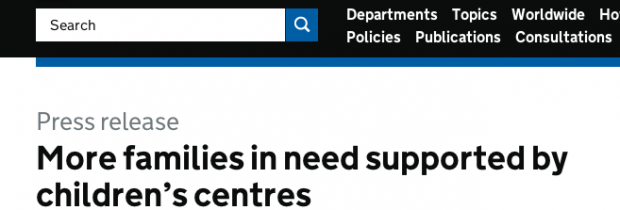Children’s Centres: doing a great job?
We spotted this rather upbeat DfE press release today, picking out some findings from the latest evaluation of Children’s Centres. The study focuses on reach:
In almost all areas the proportion of registrations in a single year, judged against the average 2011 census population aged 0-4 in a year, was very high (median 93%), though in a few centres it was much lower (around 60-65%)
Registering people is one thing, but what does this mean? The summary notes:
The high registration levels (over 90% on average) mean that most eligible families have the option to engage with services [emphasis added]
Usage stats are predictably patchier.
Results consistently showed that more than half of the users (60%) made relatively light use over the year (five or less contacts)
So when you dig into it, everything is not quite as rosy as that press release suggests. If more than half of users are using centres less than 5 times a year (and that might mean they only pitch up once) it is hardly surprising that children’s centres are finding it hard to show they really make a difference where it matters. DfE’s press release chooses to celebrate various outputs (% of centres offering particular services etc). But measurably improved outcomes (more capable, confident parents, nurturing children to better life outcomes) should ultimately be the ONLY things that matter: registrations, reach, and even whether parents think your services are ‘good’ mean nothing unless they are leading to improved outcomes.
Early Years services must be asking themselves all the time whether their activity is really making a difference (and for whom). Our work to support Essex in its review of the whole early years system has been generating insights about what ordinary, ‘just coping’ families say they need in terms of support, and how that support might most effectively be made available. More on that – including what we’ve been learning from a powerful piece of ethnographic research – very soon.
